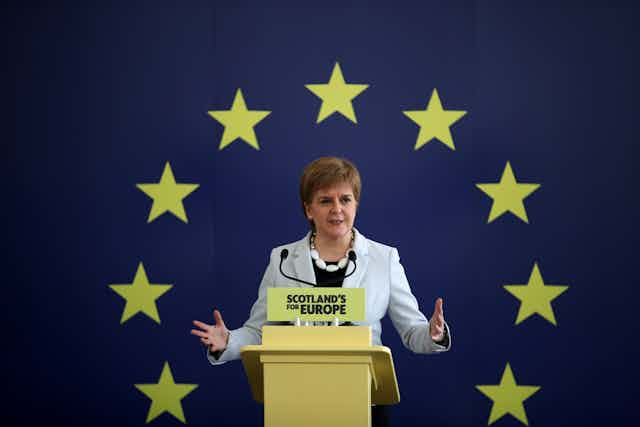The fallout from the European elections in Scotland is of interest not just to voters north of the border but also for its potential wider ramifications.
Unlike most of the rest of the UK, where the upstart Brexit Party topped the poll, in Scotland the SNP finished first yet again. The party took more than 38% of the vote, picking up half of Scotland’s six seats in the European Parliament.
This is quite a remarkable success for a party that has been in power in Scotland since 2007 and has finished top in every election since 2011.
The surge
The party had a clear and unambiguous message going into this election. It wants to stop Brexit. This allowed it to rally support from pro-Remain voters.
However, the SNP also had an anti-Westminster message: Westminster is ignoring the wishes of Scots and the best way to respond is to vote SNP.
All this matters because overshadowing everything in Scottish politics is the constitutional divide between unionists and nationalists and whether Scotland should become independent as the parties position themselves for a possible second independence referendum.
For the SNP, Scotland voting differently from the rest of the UK feeds into the narrative that Scotland is just politically different and should make its own decisions.
The SNP vote is also mainly pro-EU, but some of its voters who want to leave the EU may also want to leave the UK even more. Such voters will support the SNP anyway, viewing it as the best vehicle to deliver independence.
On the unionist side, the result looks initially quite poor for the Conservatives. Nevertheless, their percentage share of the vote was still higher than the party received in England and Wales.
The Conservative anti-independence message to an extent prevented the party from having an even worse election. They are likely to remain the main unionist party, particular as their leader Ruth Davidson has a very high profile, rivalling only the SNP’s Nicola Sturgeon, and is also relatively popular too.
Davidson, though, will want to distance herself somewhat from the UK Conservative Party leadership, given its current turmoil. Before the elections, Boris Johnson, now the main contender to replace Theresa May, was blocked from attending the Scottish Conservative and Unionist conference.
Labour losses
The big losers in Scotland were the other unionist party – Labour. The party lost both of its MEPs and a huge number of voters. It once took one in four votes in European elections but was reduced, this time around, to less than 10% of the vote.
Clearly the 2014 and 2016 referendums have taken their toll on the party but this is a particularly poor result for Richard Leonard, the Scottish Labour leader and an ally of Jeremy Corbyn. Leonard has made no real impact despite repositioning the party to the left.

If Leonard has to stand down as leader it is unlikely he will be replaced by a candidate on the left. Neil Findlay, the other key Corbyn ally in Scotland, has already announced he will be standing down at the next election to pursue other interests.
As the Scottish party leader sits on Labour’s ruling national executive this could be problematic for Corbyn. And while Corbyn is under pressure to support a second EU referendum, his Scottish party is under even greater scrutiny. Scotland voted overwhelmingly to remain in 2016 and the remain parties won more than 60% again in the European elections. The pressure on Scottish Labour is likely to intensify.
Meanwhile, the Brexit Party did finish a distant second with around 14% in Scotland but this does not place them to do well in the next Holyrood election. UKIP won a seat at the 2014 EU elections in Scotland and gained less than 2% two years later at the Holyrood elections.
The Brexit Party, if it fights other elections in Scotland, is likely to attract mainly unionist voters, fragmenting the vote even further. This would only help the SNP. A Liberal Democrat recovery in Scotland could do likewise.
What next?
The SNP is already seeking to capitalise on the European election result, immediately introducing legislation in the Scottish parliament to allow for a possible referendum on independence to be held.
The Conservative Party candidates for prime minister all agree so far that they will not be another referendum on Scottish independence. However, Scottish Conservatives will be hoping that they temper and moderate their language somewhat.
Conservative home secretary Sajid David’s comment that Scotland will not be “allowed” to hold another referendum is likely to grate even with unionists, who would rather the line that “Scots don’t want one” was used instead.
Unionists are aware that the SNP will seek to portray the constitutional issue as Scotland versus Westminster and will hope to avoid this. For the SNP it is a waiting game. The ideal situation may be perhaps a no-deal Brexit imposed by Westminster with Johnston as the new prime minister. This might just strain the 300-year-old union to breaking point.
The EU elections are over but both the SNP and Conservatives know that the real battle for Scotland in the run up to the 2021 Scottish elections and the push for indyref2.

